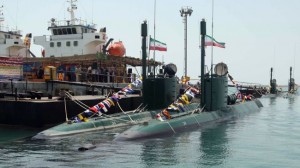 Two of Iran's indigenous Ghadir submarines[/caption]
Two of Iran's indigenous Ghadir submarines[/caption]TEHRAN (FNA)- Iran plans to launch a semi-heavy submarine soon in a bid to boost its naval capabilities in the high seas, Iranian Defense Minister Brigadier General Hossein Dehqan announced on Wednesday.
�The Defense Ministry will take another step in developing the operational capabilities of this strategic force (Navy) after this advanced submarine (Fateh) joins the Navy fleet in future,� General Dehqan said.
He stressed that as before the Defense Ministry is ready to help the Iranian Navy reach an international balance with regard to its presence in territorial and free waters.
General Dehqan reiterated that the Iranian Navy has shown that it is one of the main security elements and contributors in the Persian Gulf and the Sea of Oman.
He pointed to the defense ministry�s backup for Iran�s naval forces, and said, �Design and manufacture of different surface, subsurface, light, semi-heavy and heavy vessels like Zolfaqar missile-launching frigate, the advanced Jamaran II destroyer, Al-Sabehat, Qaem, Midget, Qadir and Huvana submarines in different classes, flying boats in different classes and floating pools in different tonnage are part of the Defense Ministry�s backup.�
In September, Iranian Navy Commander Rear Admiral Habibollah Sayyari announced that Fateh will be launched this (Iranian) year (ending on March 20, 2014).
�Based on the Navy�s plans, the Fateh submarine will be launched this year," Sayyari told reporters in Tehran in September.
He said that Fateh submarine, Kaman-class missile-launcher warships and Jamaran 2 destroyer will come into operation in the current year.
The Iranian Navy dispatched its 27th flotilla of warships to the high seas in August to protect the country's cargo ships and oil tankers against pirates.
The Iranian Navy has been conducting anti-piracy patrols in the Gulf of Aden since November 2008, when Somali raiders hijacked the Iranian-chartered cargo ship, MV Delight, off the coast of Yemen.
According to UN Security Council resolutions, different countries can send their warships to the Gulf of Aden and coastal waters of Somalia against the pirates and even with prior notice to Somali government enter the territorial waters of that country in pursuit of Somali sea pirates.
The Gulf of Aden - which links the Indian Ocean with the Suez Canal and the Mediterranean Sea - is an important energy corridor, particularly because Persian Gulf oil is shipped to the West via the Suez Canal.
By Fars News Agency
�The Iran Project is not responsible for the content of quoted articles










